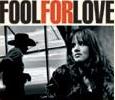Fool For Love - Review
The 'wild west' comes to the Apollo in Shaftesbury Avenue, but not in the guise of gunslingers and cowboys, even though one of the main characters is a rodeo star. No, it's the emotionally intense American west of Sam Shepard, and his gloomy interest in dark secrets and brooding, dramatic relationships. Written in 1983, 'Fool For Love' is about a fateful, all-consuming and inescapable relationship that has haunted two people since their school-days.
When the play starts, May, Eddie and an old man are holed-up in a grimy, run-down motel room on the edge of the breathless Mojave Desert. No-one is speaking, but there's already enough heat in the seedy motel's atmosphere to fry a rattle snake or two. And when Eddie eventually breaks the silence, it's the start of an emotional see-saw. 'Do you want me to go?' asks Eddie, who's just driven 2,480 miles to be with May. 'Yes and no' seems to be May's answer. 'Yes' and 'No' seem to be the only answers that either of them can come up with. Within the first few minutes of the play, Eddie leaves but quickly comes back. Then May grabs Eddie and gives him a long, lingering kiss, and then promptly knees him in the groin. Before long, it's pretty clear that these two people can't live together, but can't function apart either.
Shepard's play is really the story of May and Eddie's father, who fell in love with two women and had a child with each of them. But neither half-brother, nor half-sister knew anything of their father's closely-guarded secret before they had inadvertently started 'fooling around' during high school. Once their father's guilty secret was out, their relationship was doomed, and for the past 15 years, May and Eddie's love has tormented them like a disease. What's more, there's no resolution at the end of this sultry and rather depressing piece, their love being destined to simmer and boil repeatedly for years to come.
Although Lindsay Posner has managed to capture some of the emotional intensity that bubbles throughout Shepard's script, there's a sense of restraint holding everything back, reigning in emotions, and keeping the lid on things. It begins to boil over occasionally, but then falls back to a simmer again. And that doesn't seem to gel with what Shepard really had in mind. His script cries out for blistering, over-the-top, overwhelming emotions if only to explain why these two people keep 'coming back for more' when every brain cell in their heads cries out for it all to stop.
Bunny Christie's set is built on stilts which seems extravagant in order show a fleeting glimpse of the barren desert below the main acting area. Perhaps the aim was to give the set the feeling of a trailer, rather than a fixed building, reflecting an unstable relationship, built on 'shifting sands'.
Juliette Lewis's unusually slim figure is sensual, but also gives her a strangely adolescent bearing. Similarly, her vocal range is rather limited - bordering on mono tonal - but it too seemed to fit for this role because, in a sense, both Eddie and May are still children, locked into the emotional instability and uncertainty of the adolescence they can't escape. Martin Henderson's Eddie is more fiery and spirited than Lewis's May, and there's good support from Joe Duttine as the hapless Martin who calls just at the wrong moment to take May to a movie, and becomes the victim of Eddie's anger and rage.
The Old Man (played by Larry Lamb) is obviously a ghost, forever haunting the doomed couple. His presence is only acknowledged by Eddie when he pours him a shot of tequila and briefly speaks to him. This is an important connection, because what Shepard is interested in is how children 'follow in their parents' footsteps'. And since Eddie is pursued to the desert by the wealthy woman he's just cast-off (with explosive results) we see that Eddie is truly his father's child. Because like his father, he can't escape his love for May, but he also can't resist temptations from other sources either.
I suspect that back in 1983, 'Fool For Love' appeared more shocking to audiences than it does today. After all, regular exposure to all manner of horrific events means that an incestuous relationship ranks rather low down on our communal list of things which upset, or even offend, our sensibilities. And since this version of 'Fool For Love' lacks that overpowering emotional intensity to really knock us sideways, the play is relegated to being merely an interesting drama rather than something which is striking or truly memorable.
What the critics had to say.....
NICHOLAS DE JONGH for THE EVENING STANDARD says, "Juliette Lewis and Martin Henderson generated enough sexual electricity to set Shaftesbury Avenue throbbing...Superb production." PAUL TAYLOR for THE INDEPENDENT says, "Savagely funny and disturbing study of the kind of fatal attraction that veers between devouring need and touchy, furious rejection." MICHAEL BILLINGTON for THE GUARDIAN says, "Perfectly decent, but hardly revelatory revival ...while Lewis is psychologically astute, her voice lacks expressive range...I was slightly more impressed by the New Zealand-born Martin Henderson." CHARLES SPENCER for THE DAILY TELEGRAPH says, "Unfortunately Juliette Lewis, doesn't cut the mustard as May...plain face is oddly vacant, her voice inexpressive...unexpectedly limp production." BENEDICT NIGHTINGALE for THE TIMES says, "But if there could be more inward burning and boiling from Lewis, she still gives a performance that justifies her hop from her Hollywood habitat."
External links to full reviews from popular press
The Guardian
The Independent
Daily Telegraph
The Times
Originally published on
